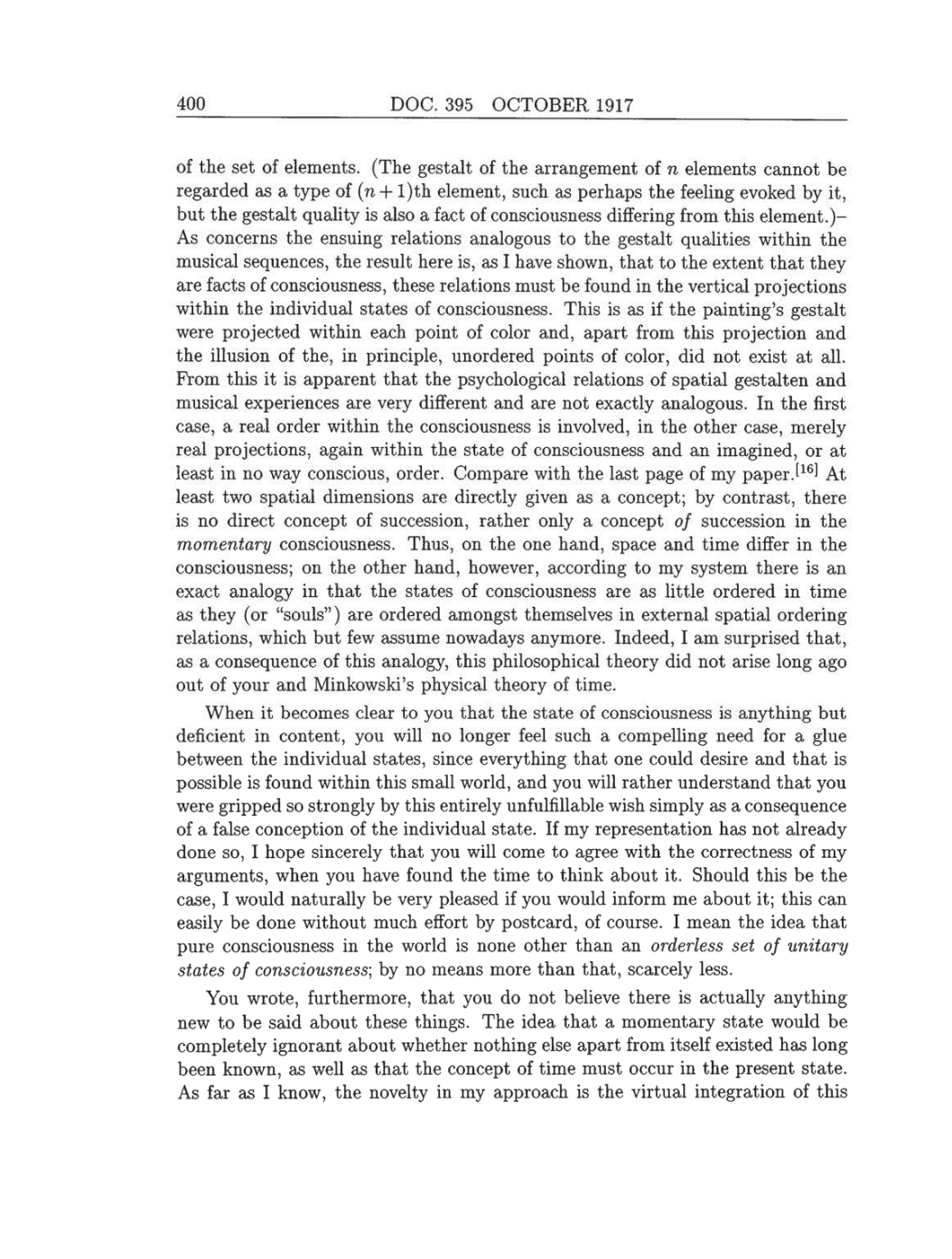400 DOC.
395
OCTOBER
1917
of
the
set of elements.
(The
gestalt
of
the
arrangement
of
n
elements
cannot be
regarded
as a
type
of
(n
+
1)th
element,
such
as
perhaps
the
feeling
evoked
by
it,
but the
gestalt quality is
also
a
fact of consciousness
differing
from
this
element.)-
As
concerns
the
ensuing
relations
analogous
to
the
gestalt qualities
within the
musical
sequences,
the
result here
is, as
I
have
shown,
that
to
the
extent
that
they
are
facts of
consciousness,
these relations must be found in
the
vertical
projections
within the
individual states of consciousness. This
is
as
if
the
painting’s
gestalt
were
projected
within each
point
of color
and,
apart
from
this
projection
and
the
illusion of
the,
in
principle,
unordered
points
of
color,
did not exist at all.
From
this it
is apparent
that the
psychological
relations of
spatial gestalten
and
musical
experiences
are
very
different and
are
not
exactly analogous.
In
the
first
case,
a
real order within
the
consciousness
is
involved,
in
the other
case,
merely
real
projections, again
within
the
state
of consciousness
and
an
imagined,
or
at
least in
no
way conscious,
order.
Compare
with
the last
page
of
my
paper.[16]
At
least
two
spatial
dimensions
are
directly
given
as a
concept; by
contrast,
there
is
no
direct
concept
of
succession,
rather
only
a
concept
of
succession in the
momentary
consciousness.
Thus,
on
the
one
hand, space
and time differ in
the
consciousness;
on
the other
hand, however, according
to
my system
there
is
an
exact
analogy
in
that the
states of consciousness
are as
little
ordered in
time
as
they
(or “souls”) are
ordered
amongst
themselves in
external
spatial
ordering
relations,
which
but
few
assume
nowadays anymore. Indeed,
I
am
surprised
that,
as a
consequence
of this
analogy,
this
philosophical theory
did not arise
long ago
out of
your
and Minkowski’s
physical
theory
of time.
When it becomes clear
to
you
that the
state
of consciousness
is anything
but
deficient in
content, you
will
no
longer
feel
such
a
compelling
need for
a glue
between
the
individual
states,
since
everything
that
one
could desire and
that
is
possible
is
found within
this
small
world,
and
you
will
rather understand that
you
were
gripped so strongly by
this
entirely
unfulfillable wish
simply as a
consequence
of
a
false
conception
of
the
individual state. If
my
representation
has not
already
done
so,
I
hope sincerely
that
you
will
come
to
agree
with
the
correctness of
my
arguments,
when
you
have found
the
time to
think about
it. Should
this
be
the
case,
I
would
naturally
be
very pleased
if
you
would inform
me
about
it;
this
can
easily
be done
without
much effort
by
postcard, of
course.
I
mean
the
idea
that
pure
consciousness in
the
world
is
none
other
than
an
orderless
set
of
unitary
states
of
consciousness;
by no means more
than
that,
scarcely
less.
You
wrote, furthermore,
that
you
do not believe
there
is actually anything
new
to
be said
about
these
things.
The idea
that
a
momentary state
would be
completely
ignorant
about
whether
nothing else apart
from itself existed has
long
been
known,
as
well
as
that the
concept
of time must
occur
in
the
present
state.
As far
as
I
know,
the
novelty
in
my approach
is
the virtual
integration
of
this
